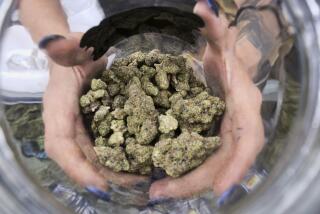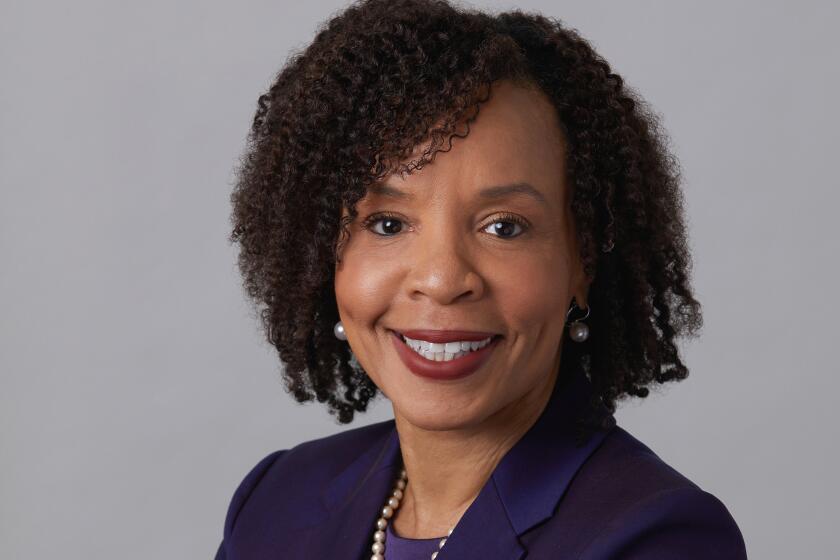A Breathless Sprint to the Political Center : Clinton: With his presidential power eroding, every decision has become a contest. Another Justice Department nominee flops.
“I was much too far out all my life,” says Stevie Smith in her famous poem, “and not waving but drowning.”
President Bill Clinton, by con trast, may be not drowning but waving. This week, Clinton, like a man caught in a treacherous undertow, tried to break free and paddle his way back to the American political mainstream. His struggle was not a pretty sight: All those strangled cries and flailing limbs looked a lot like the confusion that has marred this Administration since its start. The important thing, though, is not Clinton’s gracelessness in changing political course but the fact that he is doing it at all.
In 1992, presidential candidate Clinton and his political advisers insisted that there was no need for him to choose sides on many issues dividing this country. He was more protectionist than George Bush but also more committed to international human rights. He used the rhetoric of traditional morality but promised the left his support on issues like gays in the military. He would stimulate the economy and cut the deficit. His only enemy was “the rich,” whose increased taxes would pay for his policy initiatives.
The same smart advisers told President Clinton that he could govern the same way. He would continue his populist campaign. He would bypass the national press corps, as Ronald Reagan’s image-makers had done, by all kinds of newfangled “narrowcasting” to send customized and sometimes contradictory messages to different groups of voters.
This political cleverness went very wrong.
On the economic front, Clinton was not simply stymied by the rich. He had overestimated the appeal of populism, failed to see the depth of public concern about the deficit and underestimated people’s ability to grasp policy evasions and contradictions.
So, Clinton’s stimulus package failed in Congress, with lawmakers even proposing distinctly unpopulist caps on entitlements to drive the deficit down. When the image-makers launched Clinton’s health-care offensive by blaming the country’s low child-vaccination rate on profiteering by vaccine producers, the Administration’s arguments quickly fell apart.
Meanwhile, the social issues, which Clinton planners evidently thought would get lost amid all the talk of soaking the rich, did not disappear--and Clinton did have to choose. After gays in the military came a nominee to the Department of Housing and Urban Affairs who had proposed denying funds to the Boy Scouts because they would not allow gay Scoutmasters.
Then Clinton said his nominee to head civil-rights enforcement was C. Lani Guinier, who had written startling things about the inability of minorities to find justice in a majority-ruled society. The nominee was attacked by methods developed when her ideological allies went after Robert H. Bork in 1987. In an atmosphere of disarray and dissipating presidential power, defeats and scandals will soon emerge to make things even worse.
And emerge they did, what with the Christophe affair, Travelgate and a budget victory so narrow it smelled like a defeat.
Clinton, proving that contrary to recent evidence he is not suicidal, finally began a breathless race back to the political center. Part of it was symbolic: For instance, he has begun to talk about the middle-class tax cut again. And, of course, he has hired image-maker David Gergen, who was in the Reagan White House during the creation of the “decade of greed” economic plan. Neither Gergen nor anyone else can do for Clinton what some say Gergen did for Reagan in the image department. But the hiring was about as bald an announcement as you can get of a sea-change on President Clinton’s part.
In case anybody missed the message, Clinton said it straight out: His Administration had acquired a “tinge” that was “not connected to the mainstream, pro-change, future-oriented politics and policies that I ran for President to implement.”
Clinton also made changes that were more than symbolic. On gays in the military, the President said he would accept a compromise. He said he was willing to compromise further on his budget bill. He postponed plans to seek a hike in the minimum wage. And, in spite of emotional opposition by civil-rights organizations and black members of Congress, he withdrew Guinier’s nomination--not because the fight would have been difficult, he said, but because he had finally read her controversial writings and simply did not agree with them. This embarrassing admission was less hurtful than if the President had left the impression that he agreed with Guinier’s non-centrist positions and had abandoned her only for tactical reasons.
The danger in all this sudden center-speaking activity is that we pundits will look at it (as some are already doing) and say, “Aha! Clinton, scurrying back to the center, is simply giving another example of his inconstancy and absence of principle.” This is what happens when presidential power has eroded so far that everyone feels free to challenge a presidential action, and every presidential decision becomes a contest. This is also what happens when an occupant of the White House fails to follow the rule that the political course of a President must be turned around, when such is necessary, as gradually as a North Sea tanker in a storm.
But Clinton has managed to make his message clear, despite the distress he surely felt at dashing--indeed betraying--the hopes of many who have been his political comrades and close friends. His distress may decrease over time, since those same erstwhile friends, we can be sure, will try to cause him maximum embarrassment every time he disappoints them in this way.
So far, the President has not, in Gladstone’s terms, been a good butcher. But this time Clinton did manage to wrestle one large animal to the ground and give it a good smack between the eyes. The interest of the next few weeks will be to see whether the President can get into the habit of wielding the knife.
More to Read
Get the L.A. Times Politics newsletter
Deeply reported insights into legislation, politics and policy from Sacramento, Washington and beyond. In your inbox three times per week.
You may occasionally receive promotional content from the Los Angeles Times.






